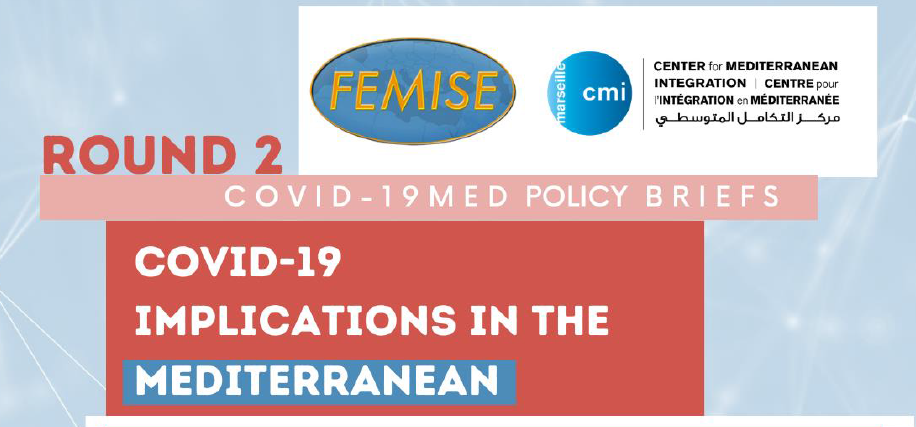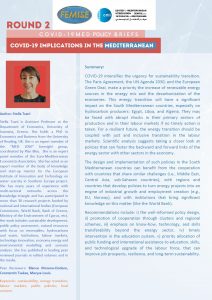
The coronavirus has proved to be a serious threat not only to people’s health but also to economies and societies of all countries, regardless of their level of development. This crisis presents a real test to the resilience of the Southern and Eastern Mediterranean countries, as it came at a time when they were challenged to keep their economies growing, facing increasing unemployment and scarce resources. The way out of the crisis will greatly depend on how countries in the region prioritise their actions, and on how they integrate and cooperate with each other in key sectors. Following the success of the first round of “COVID-19 MED BRIEFS” launched by the Center for Mediterranean Integration (CMI) and FEMISE, the two institutions decided to join forces again and launch a second round. This series of Policy Briefs is intended to pave the way for more in-depth thematic analyses and recommendations.
The seventeenth COVID-19 MED BRIEF, entitled “Energy transition, sustainability, and labour market policies: Implications and recommendations for the South Mediterranean countries” by Stella Tsani, Assistant Professor at the Department of Economics, University of Ioannina, Greece is available here
 Summary :
Summary :
COVID-19 intensifies the urgency for sustainability transition. The Paris Agreement, the UN Agenda 2030, and the European Green Deal, make a priority the increase of renewable energy sources in the energy mix and the decarbonization of the economies. This energy transition will have a significant impact on the South Mediterranean countries, especially on hydrocarbon producers: Egypt, Libya, and Algeria. They may be faced with abrupt shocks in their primary sectors of production and in their labour markets if no timely action is taken. For a resilient future, the energy transition should be coupled with just and inclusive transition in the labour markets. Scientific analysis suggests taking a closer look at policies that can foster the backward and forward links of the energy sector with other sectors in the economy.
The design and implementation of such policies in the South Mediterranean countries can benefit from the cooperation with countries that share similar challenges (i.e., Middle East, Central Asia, sub-Saharan countries), with regions and countries that develop policies to turn energy projects into an engine of industrial growth and employment creation (e.g., EU, Norway), and with institutions that bring significant knowledge on this matter (like the World Bank).
Recommendations include: i) the well-informed policy design, ii) promotion of cooperation through clusters and regional schemes, iii) emphasis on know-how, technology, and skills transferability beyond the energy sector, iv) timely intervention in the education system, v) priority allocation of public funding and international assistance to education, skills, and technological upgrade of the labour force, that can improve job prospects, resilience, and long-term sustainability.
This Policy Brief is produced as part of the series of Policy Briefs on « Responding to the Challenges of COVID-19 in the Mediterranean » that is undertaken in partnership between FEMISE and the Center for Mediterranean Integration (CMI).
The views expressed in this Brief are those of the authors and do not reflect the views of CMI or FEMISE. The contents have not been subjected to verification by CMI or FEMISE and their publication does not reflect ownership by CMI or FEMISE.


